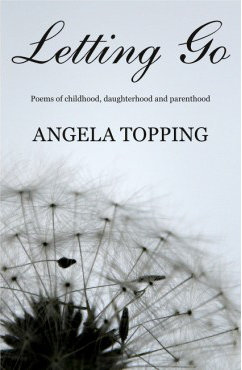 In Letting Go, Angela Topping writes about loss, she writes about love, she writes about parents and children. She holds family relationships up to the light as if she was a jeweller examining a diamond. And on every turn, she sees something fresh, and writes something wonderful. There is a thorough examination of links forged and links broken here, an analysis of the shifting tenses of the family unit.
In Letting Go, Angela Topping writes about loss, she writes about love, she writes about parents and children. She holds family relationships up to the light as if she was a jeweller examining a diamond. And on every turn, she sees something fresh, and writes something wonderful. There is a thorough examination of links forged and links broken here, an analysis of the shifting tenses of the family unit.
Angela has ten other poetry pamphlets and collections on her CV, she is what I think of as a proven poet. When I read her work I am not analysing it in the way that, thanks to years of studying, I do with some poetry, I am sitting back and enjoying the gift. I am being given something beautiful to handle and enjoy, something tactile and familiar. There’s a sense of confidence and patience within the poems, a feeling of safety, a feeling that here is a poet who absolutely knows what she is doing and she is getting it right in every poem.
Poets are drawn to writing about loss. It has to be, in one form or another, the most written about topic. So it’s refreshing to read poems that do not talk about death and longing in great crashing waves of grief. Angela’s scalpel is far more delicate, she exhibits a real skill in writing such subtle, but incredibly moving poetry. As a reader, I don’t want to be shown huge emotions that are difficult to touch, I want that huge emotion folded into something real, something I recognise, and Angela does that. She writes about what it feels like to sit on your dad’s knee, how it feels to let go of that, forever, she writes about dead goldfish, and the natural reaction to the physicality of death, she writes honestly, truthfully about life. I was reminded a little of Sharon Old’s truthful and unvarnished style when I read some of these poems.
Having said all that, I may be doing Angela a massive disservice by talking so much about the death theme in this collection. These poems cover a greater sense of scope than that, they are about severance in relationships and the inevitable letting go that one must go through with children, having done your job. You don’t get to keep them. Family is an evolving dynamic in this collection, it is not static, and people separate and move away whatever you do.
That inevitability, the helplessness is a key theme. Poems like Father’s Bronchitis, with its final lines:
He sits by the open door,
for air,
gasping like a landed carp.
There’s nothing I can do except
brew up the way he likes, put away
the bike.
elicit the sort of emotional response that poetry should – the connection – we have all been helpless for someone we love at one time or another and all watched, offering small comforts while the wall of the inevitable pain creeps towards us like a glacier. These poems are about a shared knowledge of humanity; loss is part of the journey.
This is a collection that is difficult to describe in few words. It is about more than loss. It’s a reminiscence, it’s a photo album of emotions that make up this network of being, it is a quiet intensity. There is a complicated machine beneath the skin of motherhood, parenthood and childhood. It has connections that we feel, but find difficult to identify. The title poem; so simple, so elegant, sums it up so well, the journey and all the complicated emotional pathways beneath the practical and physical. A wheel turning towards the inevitable:
But they learn to walk away
like any other guest.
Letting Go is published by Mother’s Milk Books at £8.99 in the Uk and is available from: mothersmilkbooks.com
